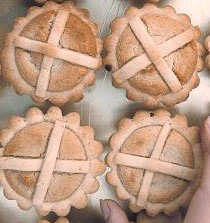Leipziger Lerche
 | |
| Type | Pastry |
|---|---|
| Place of origin | Germany |
| Region or state | Leipzig |
| Main ingredients | Shortcrust, almonds, nuts, one cherry |
The Leipziger Lerche is a pastry of Leipzig. The name originates from a delicacy popular in the Leipzig area until the 1870s. The dish used the songbird lark (German: Lerche), which was roasted with herbs and eggs and served as a filling in a pastry crust. In the year 1720, 400,000 larks were sold in Leipzig.[1]
The hunting of the songbirds was officially banned by the saxonian King Albert I in 1876 after recognition of their agricultural importance.[2] According to the Vienna Appetit-Lexikon, larks were still exported from Leipzig until the end of the 19th century.[3] Today's pastry replaced the traditional meat-filled pastry after the ban.[4] The local pastry chefs are credited for helping to preserve the larks by creating the new, sweet version of Leipziger Lerche shortly after the hunting ban was imposed.[5]
Today's version consists of a shortcrust filled with a mixture of crushed almonds, nuts and a cherry. The cherry symbolises the heart of the bird. It is topped with a grid of two crossed dough strips. The term Leipziger Lerche has been protected by the Saxonian Bakery Guild since 1998.[6]
See also
[edit]References
[edit]- ^ Irene Krauß, Chronik bildschöner Backwerke, Stuttgart 1999, P. 261 f.
- ^ Information of the Historical Museum Leipzig
- ^ Robert Habs/Leopold Rosner, Appetit-Lexikon, Badenweiler 1997 (reprint of the original version Vienna 1898)
- ^ Irene Krauß, Chronik bildschöner Backwerke, Stuttgart 1999, P. 262
- ^ Duden, Das Deutsche Test 2015, P.302
- ^ Leipziger Lerche at Deutsches Patent- und Markenamt (German)
